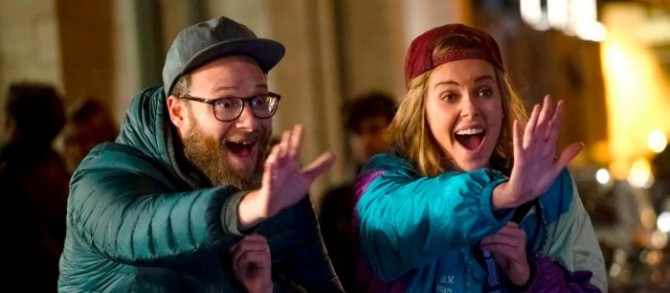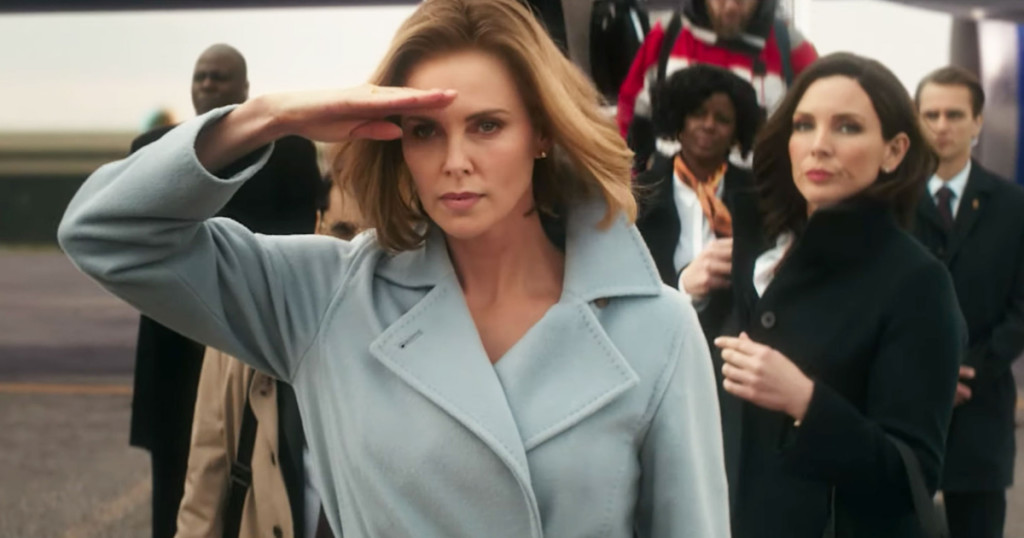Genre: Romantic Comedy
Premise: A schlubby political writer is scooped up by the Secretary Of State to help write speeches for her presidential run.
About: This script made the Black List – count with me now – EIGHT years ago. Never say die in this business, right? Dan Sterling, the script’s original writer, has written on The Office, King of the Hill, and South Park. Liz Hannah (The Post) came in to, presumably, add some authenticity and believability to Charlotte’s character. And then, of course, Seth Rogen’s uncredited gang of punch-up writers came in to add a lot of jokes, which I’ll be discussing in the review. Jonathan Levine, who’s worked with Rogen before on 50/50, directed the film.
Writer: Dan Sterling and Liz Hannah
Details: 2 hours long
Before we get started, can we all take a second to appreciate how hard it is to make a good comedy? I mean, how many truly funny comedies have there been since the beginning of the century? Five maybe? If that? That’s one every four years. I came into this screenwriting adventure thinking comedy was the easiest genre. I now believe it to be the hardest.
The Long Shot took that handicap, shoved all its chips in, and said, “I’ll raise you another handicap.” They added politics to the mix. Yeah, because politics in 2019 isn’t polarizing at all. I actually think The Long Shot did a pretty good job handling its political plotline. But here’s the final word on The Long Shot. The movie is a couple of inches shy of being really good. And, unfortunately, those couple of inches are the difference between a comedy blowing up and fading away. I mean it was RIGHT THERE. What happened?
Charlotte is the Secretary of State and one of the top Democrat hopefuls to take the office of the presidency in 2024. But when the current president, unexpectedly, decides he’s not running for re-election, Charlotte decides to take a shot (a long shot) at being the U.S.’s first female president in 2020.
There’s a small problem. Charlotte’s numbers show that she’s not funny. She needs someone to help punch up her speeches with some humor. Enter Fred Flarsky, a dopey glorified blogger who writes scathing articles on big business. While these articles are a bit… aggressive, they’re also funny. And here’s the thing – Charlotte actually knows Flarsky. She babysat for him when he was a kid. So when the two bump into each other at a fund-raising event, it’s a natural fit.
Charlotte’s team hates Flarsky. He looks like one of those old multi-colored umbrellas wrapped around a potato. And outside of his writing, he’s kinda clueless. But Charlotte likes him. And as the two work together on her big environmental pitch, a romance blossoms. There’s only one problem. Everyone knows that the optics of this perfect specimen of a human being known as Charlotte being with Flarsky aren’t ideal. Which means, sadly, their relationship is doomed.
This movie does so much right! We’ve got a super-clear high-stakes goal driving the plot – Charlotte’s bid for presidency. We’ve got two characters who we want to be together but have several levels of conflict getting in the way. We’ve got lots of great dialogue. All of the characters except for a few minor exceptions are funny. O’Shea Jackson Jr. is a movie star in the making. What I could do with just an ounce of his charm. And on top of that, all of the romance works, which is the hardest part in these movies! Theron and Rogen, surprisingly, have amazing chemistry.
And like I said, it makes for a good movie.
But then why isn’t it a GREAT movie? What’s holding it back?
For starters, Rogen’s joke people need to step the f*&% off. For crying out loud. You had a good script as is. Then Rogen’s people came in and added 50+ s&*%, p&*%, vomit, b*&^er, and bodily fluid jokes. I mean, seriously? I get it if you’re making Pineapple Express, The Extended Edition. But this is a political romantic comedy. Why is there a scene where Charlize Theron explains that she once had to s&%* in her purse during a meeting? Why is the CLIMAX of the movie, no pun intended, Seth Rogen jacking off into his own face? Seriously? That’s how you’re going to end your movie?
And here’s the real problem. When they test these jokes on audiences, people WILL LAUGH. That’s because they’re obligatory laugh jokes. People laugh at the outrageousness of them even though they don’t actually find them funny. However, Rogen’s team can point out that people DID laugh and therefore the jokes should stay. Again, I have no issues with this humor when it’s appropriate. A bodily fluid joke makes sense in a movie like The 40 Year Old Virgin, which is about a man who’s never used his bodily fluids. It makes zero sense here. This should’ve been a sweet political romantic comedy. Instead, they raunchified it, confusing the tone.
Then we had seemingly small miscues that had much bigger ramifications than the filmmakers realized. One of the major plot machinations was that Charlotte’s “humor” number was down. That was the only thing out of all of her traits the public didn’t like. But here’s the weird thing. The number was still high. She had, like, an 89 out of 100. It just wasn’t *as high* as the other numbers. The reason this is a big deal is because the ENTIRE MOVIE is built on her needing a comedy writer to make her funnier! So why are they giving her a B+ level of humor?? In comedy movies, you work with extremes. Subtle doesn’t fly. Make her comedy number a 65 so that SHE ACTUALLY NEEDS HELP. Otherwise, there’s no need to have Flarsky in the movie.
Sadly, we have yet another case of over-development. I get that this script was ten years old. But the only thing you should’ve had to update was the political stuff. They shouldn’t have messed with everything else and they ESPECIALLY shouldn’t have stuffed in a bunch of lowest common denominator jokes. These guys are comedy veterans. They should know by now that different comedies require different types of humor.
I have one last thought. I remember there was this old belief, when movie stars didn’t do TV, that went something like this: “Why would they pay for you at a theater if they can get you at home for free?” It sounded good but there wasn’t any real way to prove or disprove the hypothesis since there weren’t enough people crossing over to a study on. But then the Franchinizing happened, and movie stars were forced into television. And I think I can finally say that when there aren’t any special effects or big concepts in a movie – when the film is just about the actors, as is the case with The Long Shot – it doesn’t feel special anymore. You’re sitting there watching the movie and saying, “Was this really worth 20 bucks?” The answer, unfortunately, is no.
But I have a feeling this is going to become a huge hit on digital. Had it debuted on Netflix, it would’ve been their best romantic comedy ever, and probably would’ve gotten a lot more fanfare. It’s a good movie. It really is. It just never gets over that “great” hump.
[ ] What the hell did I just watch?
[ ] wasn’t for me
[x] worth the stream (when it comes to digital)
[ ] impressive
[ ] genius
What I learned: I’m going to steal from myself and use my original Flarsky ‘what I learned’ tip – “The impossible choice. Force one of your leads into an impossible choice at the end of the movie. Here, Charlotte must choose between her career and Flarsky. If you set that decision up well (where each choice has devastating consequences), we’ll be dying to know what they choose.” I’d add to this that when you’re writing a character piece, the “impossible choice” is really the only way to end your movie. You don’t have a big action set piece to do the heavy lifting. It’s all character. And there’s nothing more compelling than one of your characters being forced to decide between two things that they desperately want.



